WASHINGTON — Senator Marco Rubio of Florida provided a sobering analysis on Wednesday regarding the detrimental effects of America’s “unbalanced relationship” with China. His remarks aligned with the anti-globalist sentiments previously expressed by President-elect Donald Trump as he seeks confirmation for the position of Secretary of State.
During a lengthy five-hour confirmation hearing, Rubio addressed various global issues, including those affecting the Middle East, Latin America, and Eastern Europe. However, he dedicated a significant portion of his testimony warning that, without urgent and meaningful changes in policy, China could continue to pose the “biggest threat” to American prosperity in the 21st century. “If we don’t change course, we are going to live in a world where much of what matters to us on a daily basis—from our security to our health—will depend on whether the Chinese allow us to have it,” Rubio stated before the Senate Foreign Relations Committee.
When probed about NATO, the longstanding security alliance often criticized by Trump, Rubio underscored its importance, referring to it as a “very important alliance.” He also supported Trump’s assertion that some European allies should contribute more financially to their collective self-defense. Rubio expressed that the U.S. must evaluate whether it wants to take on a “primary defense role” or simply act as a “backstop” against potential threats.
The 53-year-old Republican senator articulated his critique of China and other adversarial nations before his colleagues on the Foreign Relations panel, a committee he served on for fourteen years. His appearance was met with bipartisan warmth, and he lightheartedly remarked on the peculiarity of being on the opposite side of the dais. “I hope I can earn your support, whether it’s because you believe I would do a good job, or because you want to get rid of me,” he quipped during his introductory remarks.
Beneath the congeniality, Rubio pointed to America’s susceptibility to China as a consequence of the shift towards globalism, which he characterized as a “weapon being used against us.” He emphasized the need for the U.S. to prioritize “our core national interests above all else.” This position represented a striking opening approach from Rubio, who was born in Miami to Cuban immigrants and, if confirmed, would be the first Latino to hold the position of the country’s top diplomat.
This confirmation hearing marks a pivotal moment in the political journey of Rubio, a third-term senator whose dynamic with Trump has developed significantly over the past decade. Initially, they were rivals who exchanged insults during their respective 2016 presidential campaigns; however, they became strong allies as Trump campaigned for re-election.
Rubio was part of the “Tea Party” movement that swept into Congress in 2010 and previously advocated for a path to citizenship for undocumented immigrants. Nonetheless, echoing many of his Republican peers, Rubio has shifted towards Trump’s more hardline immigration policies, particularly regarding deportations, expected to resume once Trump assumes office.
In contrast to several of Trump’s other Cabinet choices, Rubio appears likely to secure an easy confirmation, garnering support from both Republicans and – notably – Democrats who view him as a “responsible” selection for representing U.S. interests abroad. Many anticipation that he will be among the first of Trump’s Cabinet nominees to receive approval.
Democratic Senator Brian Schatz, who served alongside Rubio on the Foreign Relations Committee, expressed optimism that the Florida senator would reject the isolationist tendencies of certain Trump associates. “I think Marco is a hawk, but he’s also an internationalist,” Schatz stated. “The challenge for him will be to uphold the bipartisan tradition of America being indispensable in world affairs.”
Rubio’s perspective on foreign relations is firmly established from his extensive experience on both the Foreign Relations and Senate Intelligence Committees. He has consistently conveyed urgent warnings about looming military and economic threats facing the nation.
If confirmed, Rubio would oversee U.S. foreign policy, although his influence may be secondary to Trump’s vigorous engagement on the world stage. Even before officially taking office, Trump has stirred unease among foreign nations through controversial remarks, including threats regarding the Panama Canal and Greenland.
Addressing the canal question during the hearing, Rubio conveyed some legal uncertainties but noted, “Panama is a great partner in a lot of other issues and I hope we can resolve this issue.” Furthermore, he indicated discontent with the Biden administration’s recent designation changes regarding Cuba, which he has vehemently opposed over the years.
When asked whether Cuba should remain designated as a state sponsor of terrorism, Rubio replied unequivocally, “without a question,” and reiterated that the forthcoming administration would likely reverse the Biden administration’s decisions related to Cuba.
The role of Secretary of State has been historically significant in shaping U.S. foreign policy since its inception, beginning with Thomas Jefferson under President George Washington. Leaders in this role, from Jefferson to James Madison and John Quincy Adams, have often later ascended to the presidency.
In contrast, recent secretaries of state have faced varying degrees of success in their political aspirations; for instance, John Kerry lost the 2004 presidential election before taking the top diplomatic post, while Hillary Clinton was defeated by Trump in 2016.
Successful secretaries of state have demonstrated a strong alignment with their respective presidents, akin to figures like James Baker under George H.W. Bush, and Condoleezza Rice under George W. Bush. Rubio’s path mirrors that of Clinton, having transformed from a political adversary to a nominee.
Trump’s initial secretary of state, Rex Tillerson, experienced a tumultuous tenure, eventually being dismissed by Trump through social media, a possibility that adds to the complex dynamics Rubio must navigate.




